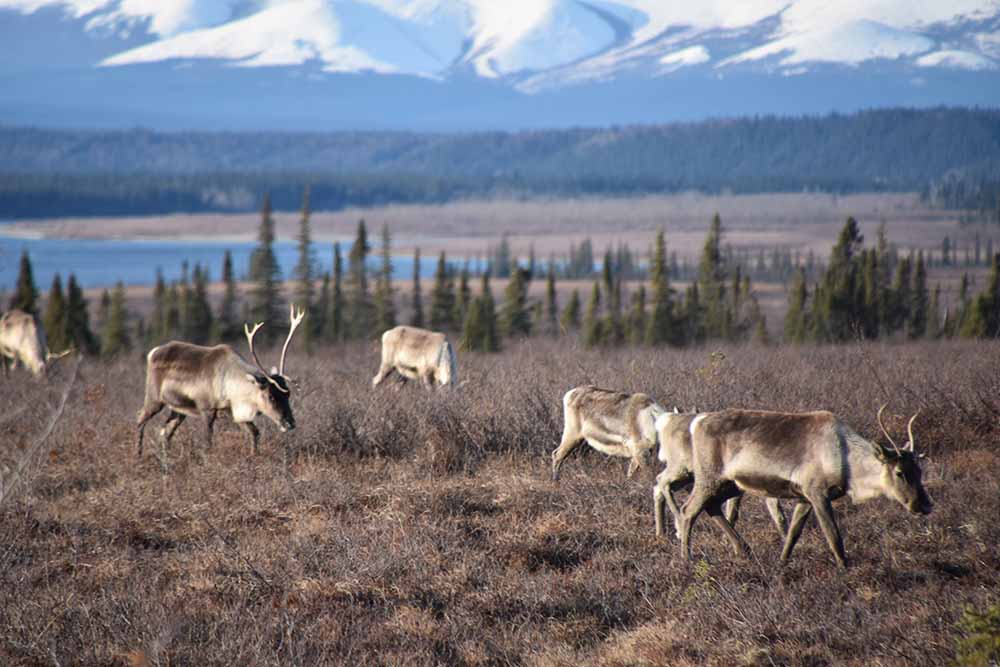News Release
You are viewing ARCHIVED content published online before January 20, 2025.
Please note that this content is NOT UPDATED, and links may not work. For current information,
visit https://www.nps.gov/aboutus/news/index.htm.

NPS/Kyle Joly
News Release Date: May 6, 2021
Contact: Kyle Joly
ANCHORAGE, Alaska — On May 7, the journal Science, announces the launch of the Global Initiative on Ungulate Migration (GIUM) in an article entitled “Mapping out a future for ungulate migrations.” An international team of 92 scientists and conservationists created the first-ever global atlas of ungulate (hooved mammal) migrations, working in partnership with the United Nations Convention on the Conservation of Migratory Species of Wild Animals (CMS). This unique United Nations treaty brings countries and wildlife experts together to address the conservation needs of terrestrial, aquatic, and avian migratory species and their habitats around the world.Dr. Kyle Joly, a National Park Service wildlife biologist and co-author of the paper emphasizes the important role that Alaska plays in sustaining many of these populations. “From humpback whales to Arctic terns, Alaska is home to some of the most spectacular migrations in the world. In fact, Alaska caribou have some of the longest terrestrial migrations on the planet,” said Joly. Specifically, the new global initiative will map ungulate migration routes, including caribou and moose, using the latest GPS tracking technology, mapping software, and data-sharing platforms. “The CMS treaty provides a global platform for the conservation and sustainable use of migratory animals and their habitats,” Dr. Joly said.
The international science team will incorporate local and indigenous knowledge and, where possible, map lost migrations and document local and historical knowledge of animal movements. The detailed maps of the seasonal movements of herds worldwide will help governments, indigenous people, and local communities to identify current and future threats to migrations and implement conservation actions to sustain them in the face of an expanding human footprint and climate change.
Migratory animals depend on different habitats to feed, breed, and rest. If their movements are restricted, the survival of entire populations can be at stake. Unfortunately, many ungulate migrations are in decline due to barriers like roads, fences, and other types of development. Climate change impacts related to the timing of plant green up or amount and distribution of rain, further complicate how the migratory herds time and navigate their seasonal movements.
Migratory ungulates are an essential part of natural ecosystems. The migrations also contribute to local and regional economies through harvest and tourism and are woven into the culture of numerous communities. Arctic caribou in Alaska, for example, have been relied upon by Alaska Natives for more than ten thousand years. “Caribou, and other migratory ungulates, are a critical element of the fabric of Alaska’s environment, as well as its people, culture, and history: conserving these species and their migratory routes for the generations to come is our responsibility” noted Dr. Joly.
The launching of the GIUM is timely given the increasing international focus on protecting biodiversity. A new UN global strategy on biodiversity known as the Post-2020 Global Biodiversity Framework is expected to be agreed to this year. CMS Parties have singled out the importance of ecological connectivity, including animal migrations, as a key priority for the new framework.
For More Information
International Experts Partner with UN to Launch First Global Initiative to Map Ungulate Migrations, Press Release, May 6, 2021
Mapping Migration Corridors for Conservation
Mapping out a future for ungulate migrations, Science
Science Commentary video
Global Initiative on Ungulate Migration
Longest terrestrial migrations and movements around the world, Scientific Reports (2019)
The Great Caribou Migration, a story map on the Western Arctic Caribou Herd migration
Monitoring caribou in Alaska's Arctic parks
About Kyle Joly
Last updated: May 6, 2021
